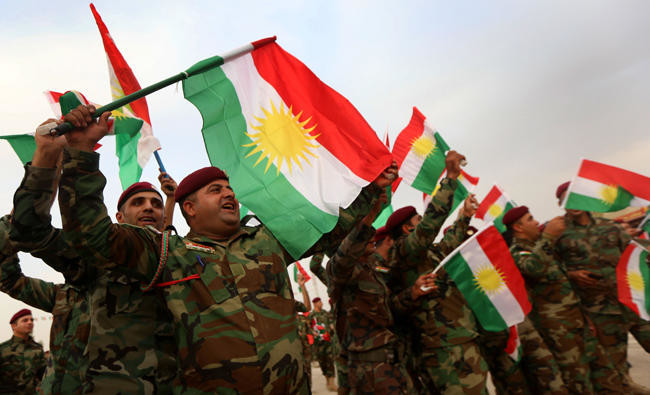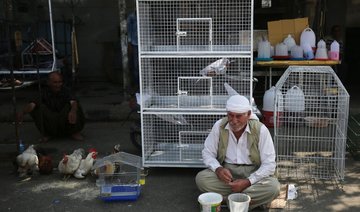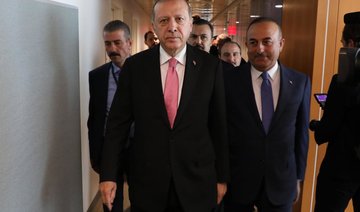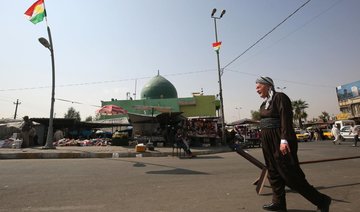ANKARA: Turkey, Iran and Iraq on Thursday warned of possible countermeasures against the Kurdish Regional Government (KRG) if it goes ahead with its independence referendum for Iraqi Kurdistan.
The foreign ministers of the three countries issued a joint statement underlying their concerns that the referendum, scheduled for Sept. 25, could trigger regional conflicts.
“The three ministers emphasized that the referendum will not be beneficial for the Kurds and the KRG, and agreed, in this regard, to consider taking countermeasures in coordination,” the statement read, without elaborating on the measures.
The statement urged the international community to intervene, reiterated the ministers’ commitment to maintaining Iraq’s territorial and political unity, and described the referendum as unconstitutional.
Turkey has the largest Kurdish population in the region, and Ankara — which said the vote would be a “grave mistake” — worries that it could boost separatist sentiment among Turkish Kurds.
Considered a terror organization by Turkey, the US and EU, the Kurdistan Workers’ Party (PKK) has been conducting an armed insurgency against the Turkish state for more than three decades.
As a show of force, Turkey moved tanks and troops to its southern border with Iraq ahead of the vote, with rocket launchers affixed on armored vehicles directed at the frontier.
Turkey’s Habur border crossing is economically vital for the KRG, as it is the main passageway for cross-border trade for landlocked Iraqi Kurdistan.
Trade between Turkey and KRG reached $8.5 billion last year, and there are about 1,300 Turkish companies operating in Iraqi Kurdistan. Turkey is also a key buyer of oil and natural gas from the KRG.
Ahmad Majidyar, resident fellow and director of the IranObserved project at the Middle East Institute in Washington, said the joint statement means to send a strong signal to the US and European powers that if they do not stop the referendum, the consequences will be dire.
“Both Turkey and Iran have threatened retaliatory measures, including border closures and economic sanctions, if the KRG goes ahead with the referendum. But it’s too soon to determine if their tough rhetoric will translate into action,” Majidyar told Arab News.
But despite recent steps by Tehran and Ankara to reconcile their differences and cooperate more on regional issues, there is deep distrust between them, he added.
“Turkey, for example, wouldn’t want to cut all relations with the KRG and allow Iran and other regional countries to fill the void,” he said.
Although Ankara has legitimate fears about the referendum, Majidyar said it has to consider both its strategic and economic interests, as Iraqi Kurdistan exports more than 500,000 barrels of oil per day via Turkey to the Mediterranean.
“Irbil and Ankara have also had close military cooperation, and Turkey has military bases in Iraqi Kurdistan,” he added.
“It’s unlikely that Ankara will sever all relations with the KRG, even if the latter proceeds with the referendum next week.”
Mehmet Seyfettin Erol, head of the Ankara-based think tank ANKASAM, told Arab News that the joint statement is an ultimatum to the KRG, and shows its three neighbors’ determination to coordinate against a perceived common threat.
Gulriz Sen, an Iran expert at TOBB University in Ankara, said the statement demonstrates a strong alignment of interests in opposing Kurdish demands and aspirations for independence.
“Even though maintaining the territorial integrity of Iraq has always been a common objective for Turkey and Iran, regional geopolitics so far have drawn Turkey and Iran apart by deepening their rivalry in the Syrian and Iraqi crises,” Sen told Arab News.
“This statement once again shows their mutual stance vis-a-vis the Kurdish issue. There were already hints of possible cooperation and coordination with the high-level visit of Iran’s chief of staff, Gen. Mohammad Bagheri.”
Sen said the three countries seem united in exerting military and economic pressure on the KRG, as shown by Turkey’s recent military drill at the Iraqi border.
Turkey’s National Security Council and Cabinet will convene on Friday to announce what countermeasures will be taken if the referendum goes ahead.
Turkey, Iran, Iraq join forces to thwart Kurdish referendum
Turkey, Iran, Iraq join forces to thwart Kurdish referendum

King Abdullah, Bulgarian president co-chair Aqaba Process meetings in Sofia

- Initiative aims to bolster cooperation on security, counterterrorism issues
- King held separate talks with several regional leaders on sidelines of event
LONDON: King Abdullah II of Jordan and Bulgarian President Rumen Radev co-chaired the third round of the Aqaba Process meetings in Sofia on Friday, bringing together international leaders to address pressing security challenges in the Balkans and beyond, the Jordan News Agency reported.
The Aqaba Process Balkans III forum, jointly organized by Jordan and Bulgaria, tackled issues such as regional security, counterterrorism efforts, online radicalization and illegal migration. The participants also explored opportunities for greater international cooperation, including intelligence sharing and strategic partnerships in combating extremism.
Attending the event were heads of state, government officials and security representatives from Serbia, Albania, North Macedonia, Montenegro, Slovenia, Kosovo, Bosnia and Herzegovina, Croatia, Spain, Greece, Italy, France, the UK, US and Japan.
Prince Ghazi bin Muhammad, King Abdullah’s personal envoy and chief adviser on religious and cultural affairs, was among the attendees, while several international organizations, including the EU, Interpol, Global Internet Forum to Counter Terrorism and the Organization for Security and Cooperation in Europe, were also represented.
On the sidelines of the forum, King Abdullah held meetings with several regional leaders, including Slovenian President Natasa Pirc Musar, Albanian President Bajram Begaj, Kosovan President Vjosa Osmani-Sadriu, North Macedonian President Gordana Siljanovska Davkova, Montenegrin President Jakov Milatovic and Serbian President Aleksandar Vucic.
Launched by the king in 2015, the Aqaba Process is designed to enhance coordination between regional and international actors in the fight against terrorism and extremism. It fosters military, security and intelligence cooperation, focusing on counterterrorism strategies and the exchange of expertise.
Previous meetings have been hosted by Jordan, Albania, Brazil, Indonesia, the Netherlands, Nigeria, Norway, Rwanda, Singapore, Spain, the US and the UN General Assembly.
Discussions have covered diverse regions such as East Africa, Southeast Asia, Latin America, West Africa and the Sahel.
In Tunisia, snails inch toward replacing red meat as people turn to cheaper protein

- Snails have been consumed in Tunisia for more than seven millenia
- Low in fat and high in iron, calcium and magnesium, snails offer both nutritional value and economic relief
AKOUDA, Tunisia: In fields outside their hometown in central Tunisia, an increasing number of unemployed young men are seeking a new way to make a living, picking snails off of rocks and leaves and collecting them in large plastic bags to take to the local market to be sold.
More and more people, they say, are buying the shelled wanderers as the price of market staples remains high and out of reach for many families.
“They’re profitable, beneficial and quite in demand,” said Karim, a 29-year-old snail seller from the village of Akouda said.
Snails have been consumed in Tunisia for more than seven millenia, according to research published last year in the journal Archaeological and Anthropological Sciences. In today’s world considered mostly a bistro delicacy, they’re again gaining traction in Tunisia as a practical alternative to red meat — a protein-rich substitute that pairs perfectly with salt, spices, and bold seasonings.
The snails are a lifeline for some in Tunisia, where youth unemployment now hovers above 40 percent and inflation remains high, three years after spiking to its highest levels in decades. A lack of opportunity has fueled social discontent throughout the country and, increasingly, migration to Europe.
Low in fat and high in iron, calcium and magnesium, snails offer both nutritional value and economic relief. In a country where unemployment runs high and median wages remain low, they cost about half as much as beef per kilogram and often less when sold by the bowl.
“Snails are better for cooking than lamb. If lamb meat costs 60 dinars ($19.30), a bowl of snails is five dinars ($1.60),” a man named Mohammed said at the Akouda market.
As the price of meat and poultry continues to rise, more Tunisians are turning to affordable, alternative sources of protein. Beyond their economic appeal, these substitutes are also drawing interest for their environmental benefits. Scientists say they offer a more sustainable solution, producing far fewer carbon emissions and avoiding the deforestation linked to traditional livestock farming.
Wahiba Dridi, who serves snails at her restaurant in Tunis, cooks them in a traditional fashion with peppers and spices. She said they were popular throughout this year’s Ramadan, which ended last week. Though Tunisian Muslims traditionally eat red meat at the meals during which they break their daily fasts, a kilogram of snails costs less than 28 Tunisian dinars ($9) compared to beef, which costs 55 dinars per kilogram ($18).
“If people knew the value of snails they would eat them all year long,” Dridi said.
US sending Israel 20,000 assault rifles that Biden had delayed, say sources

- The rifle sale is a small transaction next to the billions of dollars worth of weapons that Washington supplies to Israel
- The March 6 congressional notification said the US government had taken into account “political, military, economic, human rights, and arms control considerations“
WASHINGTON: The Trump administration moved forward with the sale of more than 20,000 US-made assault rifles to Israel last month, according to a document seen by Reuters and a source familiar with the matter, pushing ahead with a sale that the administration of former president Joe Biden had delayed over concerns they could be used by extremist Israeli settlers.
The State Department sent a notification to Congress on March 6 for the $24 million sale, saying the end user would be the Israeli National Police, according to the document.
The rifle sale is a small transaction next to the billions of dollars worth of weapons that Washington supplies to Israel. But it drew attention when the Biden administration delayed the sale over concerns that the weapons could end up in the hands of Israeli settlers, some of whom have carried out attacks on Palestinians in the Israeli-occupied West Bank.
The Biden administration has imposed sanctions on individuals and entities accused of committing violence in the Israeli-occupied West Bank, which has seen a rise in settler attacks on Palestinians.
On his first day in office on January 20, Trump issued an executive order rescinding US sanctions on Israeli settlers in a reversal of US policy. Since then, his administration has approved the sale of billions of dollars worth of weapons to Israel.
The March 6 congressional notification said the US government had taken into account “political, military, economic, human rights, and arms control considerations.”
The State Department did not respond to a request for comment when asked if the administration sought assurances from Israel on the use of the weapons.
CLOSE TIES
Since a 1967 Middle East war, Israel has occupied the West Bank, which Palestinians want as the core of an independent state, and has built settlements that most countries deem illegal. Israel disputes this, citing historical and biblical ties to the land.
Settler violence had been on the rise prior to the eruption of the Gaza war, and has worsened since the conflict began over a year ago.
Trump has forged close ties to Netanyahu, pledging to back Israel in its war against Hamas in the Gaza Strip. His administration has in some cases pushed ahead with Israel arms sales despite requests from Democratic lawmakers that the sales be paused until they received more information.
The US Senate on Thursday overwhelmingly rejected a bid to block $8.8 billion in arms sales to Israel over human rights concerns, voting 82-15 and 83-15 to reject two resolutions of disapproval over sales of massive bombs and other offensive military equipment.
The resolutions were offered by Senator Bernie Sanders of Vermont, an independent who caucuses with Democrats.
The rifle sale had been put on hold after Democratic lawmakers objected and sought information on how Israel was going to use them. The congressional committees eventually cleared the sale but the Biden administration kept the hold in place.
The latest episode in the decades-old Israeli-Palestinian conflict began with a Hamas attack on Israeli communities on October 7, 2023 with gunmen killing 1,200 people and taking more than 250 hostages, according to Israeli tallies. Israel’s campaign has so far killed more than 50,000 Palestinians, Gaza health authorities say.
Israel’s National Security Minister Itamar Ben-Gvir, a far-right member of Prime Minister Benjamin Netanyahu’s government, oversees the Israeli police force. The Times of Israel newspaper in November 2023 reported that his ministry has put “a heavy emphasis on arming civilian security squads” in the aftermath of October 7 attacks.
Medecins Sans Frontieres ‘appalled’ by second staff member killed in Gaza within weeks

- Hussam Al Loulou died in the strike on Apr. 1 in central Gaza
GENEVA: Global medical charity Medecins Sans Frontieres said on Friday it was appalled and saddened by the killing of one of its staff by an air strike in Gaza, the second within two weeks.
Hussam Al Loulou died in the strike on Apr. 1 in central Gaza, alongside his wife and 28-year-old daughter, the organization said.
Uganda president holds talks with South Sudanese leaders to try to avoid civil war

- Goc said that the country’s leadership had assured Museveni of its commitment to implement the peace agreement
- Uganda last month deployed troops to South Sudan to support the government
NAIROBI: Uganda’s President Yoweri Museveni was expected to meet South Sudanese officials on the second day of his trip to the capital, Juba, as the UN has expressed concern of a renewed civil war after the main opposition leader was put under house arrest.
Museveni, who is among the guarantors of a 2018 peace agreement that ended a five-year civil war, held closed-door discussions with President Salva Kiir on Thursday.
South Sudan’s Foreign Minister Mohammed Abdallah Goc said that the country’s leadership had assured Museveni of its commitment to implement the peace agreement.
South Sudan’s political landscape remains fragile and recent violence between government troops and armed groups allied to the opposition have escalated tension.
Uganda last month deployed troops to South Sudan to support the government, but it was criticized by South Sudan’s main opposition party SPLM-IO, whose leader Riek Machar is under house arrest on charges of incitement.
In early March, the armed group loyal to Machar attacked a UN helicopter that was on a mission to evacuate government troops from the restive northern Upper Nile State.
Western countries including Germany and Norway have temporarily closed their embassies in Juba while the USand the UK have reduced embassy staff.






















